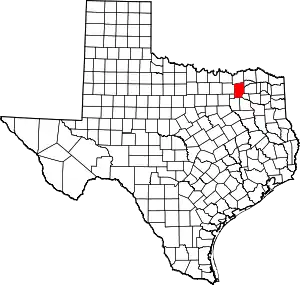Greenville, Texas
Greenville (locally /ˈɡriːnvəl/ GREEN-vəl) is a city in Hunt County, Texas, United States, about 50 miles (80 km) northeast of Dallas. It is the county seat and largest city of Hunt County.[10] As of the 2020 census, the city population was 28,164.
Greenville, Texas | |
|---|---|
.jpg.webp) Lee Street in downtown Greenville | |
 Flag | |
| Motto(s): "Rich Heritage, Vibrant Future"[1] | |
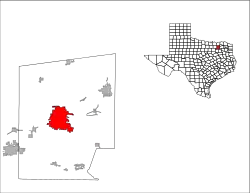 Location of Greenville in Hunt County, Texas | |
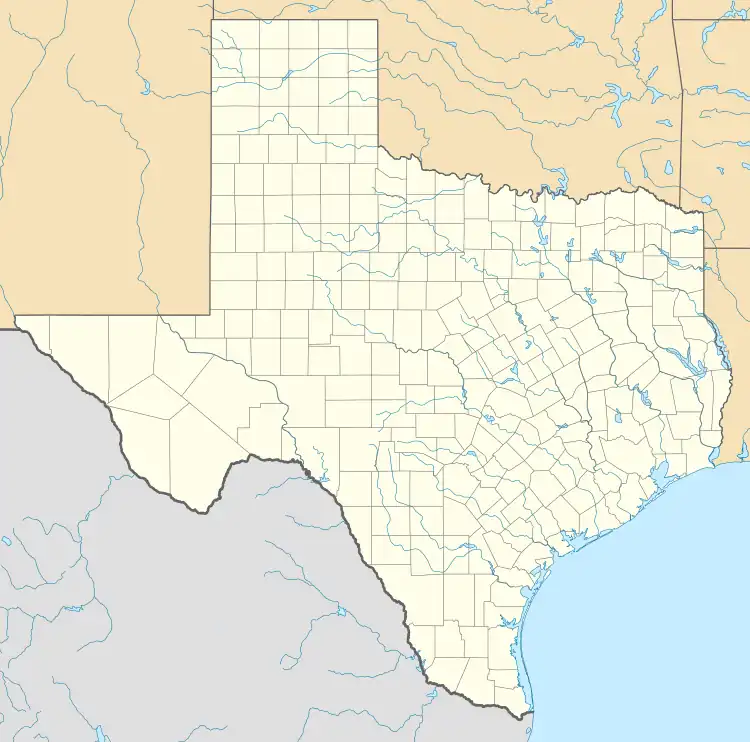 Greenville Location within Texas  Greenville Location within the United States | |
| Coordinates: 33°7′34″N 96°6′35″W | |
| Country | |
| State | |
| County | Hunt |
| Incorporated | April 13, 1852[2] |
| Named for | Thomas J. Green[3] |
| Government | |
| • Type | Council-Manager |
| • City Council | Mayor Jerry Ransom Place 1 Vacant Place 2 Al Atkins Place 3 Kristen Washington Place 4 Tim Kruse Place 5 Ben Collins Place 6 Kenneth Freeman[4] |
| • City Manager | Summer Spurlock[5] |
| Area | |
| • Total | 33.11 sq mi (85.75 km2) |
| • Land | 32.29 sq mi (83.62 km2) |
| • Water | 0.82 sq mi (2.12 km2) |
| Elevation | 541 ft (165 m) |
| Population (2020)[7] | |
| • Total | 28,164 |
| • Density | 850/sq mi (330/km2) |
| Time zone | UTC-6 (Central (CST)) |
| • Summer (DST) | UTC-5 (CDT) |
| ZIP codes | 75401–75404 |
| Area code(s) | 903, 430 |
| FIPS code | 48-30920[8] |
| GNIS feature ID | 1377755[9] |
| Website | www |
Greenville was named for Thomas J. Green,[3] a significant contributor to the founding of the Texas Republic.[11]
History
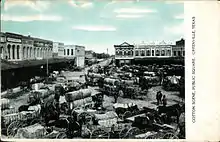
Greenville was founded in 1846. The city was named after Thomas J. Green, a significant contributor to the establishment of the Texas Republic. He later became a member of the Congress of the Texas Republic.
As the Civil War loomed, Greenville was divided over the issue of secession, as were several area towns and counties. Greenville attorney and State Senator Martin D. Hart was a prominent Unionist. He formed a company of men who fought for the Union in Arkansas, even as other Greenville residents fought for the Confederacy. The divided nature of Greenville and Hunt County is noted by a historical marker in "The SPOT" Park at 2800 Lee Street in downtown Greenville. In the post-Civil War era, Greenville's economy became partly dependent on cotton, as the local economy entered a period of transition.[12]
With a population of 12,384 in the 1920 census, the city was the 20th-largest city in Texas at the time.
In World War II, the Mexican Escuadrón 201 was stationed in Greenville while training at nearby Majors Field.
Greenville was notorious for a large sign, installed on July 7, 1921, over Lee Street, the main street in the downtown district, between the train station and the bus station in the 1920s to 1960s. The sign read: "Welcome to Greenville, The Blackest Land, The Whitest People."[13][14] According to history teacher Paul E. Sturdevant of Greenville, the original intent behind "the whitest people" was to define "the citizens of Greenville as friendly, trustworthy, and helpful was sincere, and it was meant to include all citizens, regardless of race."[14] In pre-civil rights America, the phrase "That's mighty White of you" meant that you were honest, not like suspect Blacks. The sign thus acquired racial overtones, and the original sign was taken down and placed into storage on April 13, 1965, possibly at the urging of Texas Governor John Connally, who had made a visit to the town weeks before.[14] In 1968, Greenville's Sybil Maddux had the sign reinstalled, with the wording modified to read "The Greatest People"; the original sign is in the collection of the Audie Murphy American Cotton Museum.[14]
In 1957, Greenville annexed the small town of Peniel, which had been founded in 1899 as a Pentecostal Church of the Nazarene community centered around Texas Holiness University. The annexation was approved by the citizens of Peniel, which at the time had a population around 157.[15]
On May 12, 2011, a white buffalo was born near Greenville during a thunderstorm on the ranch of Arby Littlesoldier, who identified himself as a great-great grandson of Sitting Bull. A public naming ceremony and dedication was held on June 29, 2011, during which the male calf was officially given the name "Lightning Medicine Cloud".[16] However, on August 21, 2012, Lightning Medicine Cloud died. The sheriff's department declared it had died from a bacterial infection,[17] but the owners disagree, claiming that the buffalo was allegedly skinned by an unknown party.[18]
Geography
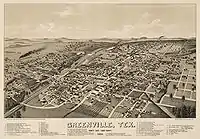
Greenville is located in North Texas at 33°7′34″N 96°6′35″W (33.126004, −96.109703),[19] in central Hunt County, in the heart of the Texas blackland prairies, 50 miles (80 km) northeast of Dallas and approximately 45 miles (72 km) south of the Texas/Oklahoma border, on the eastern edge of the Dallas/Fort Worth Metroplex.
According to the U.S. Census Bureau, Greenville has a total area of 33.4 square miles (86.6 km2), of which 32.6 square miles (84.5 km2) are land and 0.1 square miles (0.2 km2), or 2.46%, is covered by water.[7] The Cowleech Fork of the Sabine River flows through the northeastern part of the city.
Climate
Greenville has a humid subtropical climate. Due to its location on the North Texas prairies, its weather is typically humid with mild precipitation.
Demographics
| Census | Pop. | Note | %± |
|---|---|---|---|
| 1890 | 4,330 | — | |
| 1900 | 6,860 | 58.4% | |
| 1910 | 8,850 | 29.0% | |
| 1920 | 12,384 | 39.9% | |
| 1930 | 12,407 | 0.2% | |
| 1940 | 13,995 | 12.8% | |
| 1950 | 14,727 | 5.2% | |
| 1960 | 19,087 | 29.6% | |
| 1970 | 22,043 | 15.5% | |
| 1980 | 22,161 | 0.5% | |
| 1990 | 23,071 | 4.1% | |
| 2000 | 23,960 | 3.9% | |
| 2010 | 25,557 | 6.7% | |
| 2020 | 28,164 | 10.2% | |
| U.S. Decennial Census | |||
| Race | Number | Percentage |
|---|---|---|
| White (NH) | 14,525 | 51.57% |
| Black or African American (NH) | 3,892 | 13.82% |
| Native American or Alaska Native (NH) | 142 | 0.5% |
| Asian (NH) | 368 | 1.31% |
| Pacific Islander (NH) | 40 | 0.14% |
| Some Other Race (NH) | 108 | 0.38% |
| Mixed/Multi-Racial (NH) | 1,207 | 4.29% |
| Hispanic or Latino | 7,882 | 27.99% |
| Total | 28,164 |
As of the 2020 United States census, there were 28,164 people, 10,454 households, and 6,602 families residing in the city.
Economy
.jpg.webp)
.jpg.webp)
In early years, Hunt County was known as the cotton capital of the world. The world's largest inland cotton compress was located in Greenville until it was destroyed by fire in the mid-1900s.
Currently, the largest industry is L3Harris[23] Mission Integration Division (MID, formerly L3, E-Systems, Raytheon Intelligence and Information Systems (RIIS, IIS)) a major U.S. defense contractor located at Majors Airport. This airport, created in 1942 and initially financed by the local Rotary Club, was used as a training base for P-47 Thunderbolt fighter pilots in World War II, and since then has served as a focal point for economic growth in Greenville.
Tourism is playing an increasing role in the local economy, with attractions such as Splash Kingdom Water Park located on Interstate 30, and the redeveloping historic downtown featuring Landon Winery and the restored vintage Texan Theater, which opened in 2014. Greenville is also known for its saddlemaking industry.
.jpg.webp)
According to the city's 2017–2018 Comprehensive Annual Financial Report,[24] the top employers in the city are:
| # | Employer | # of Employees |
|---|---|---|
| 1 | L3Harris | 6,500 |
| 2 | Hunt Regional Medical Center | 1,100 |
| 3 | Greenville Independent School District | 800 |
| 4 | McKesson | 500 |
| 4 | Hunt County | 500 |
| 6 | Cytec Engineered Materials | 350 |
| 6 | Walmart Supercenter | 350 |
| 8 | Masonite International | 300 |
| 8 | Weatherford International | 300 |
| 10 | Raytheon | 200 |
.jpg.webp)
Entertainment includes multiple concerts at the Greenville Municipal Auditorium; the DSO Concert Series, which brings the world-famous Dallas Symphony Orchestra to Greenville for three concerts and an additional children's concert per year; and community theatre productions from Greenville Family Theatre and Greenville Theatre Works. The historic Texan Theatre brings in multiple concerts each year, and local clubs with musical entertainment, live theater in nearby Commerce, local art shows, a movie theater and a bowling alley offer year-round entertainment.
Tourism draws include the Audie Murphy/American Cotton Museum and the historic downtown area, which includes wineries, antique malls, public gardens, boutique shopping, and regular events at the 1,400-seat Greenville Municipal Auditorium. The Lee Street Jamboree is held the third weekend each September and includes the Cotton Patch Challenge Bicycle Ride. Each year the community and city sponsor a Christmas Parade and Veteran's Day Parade. In November each year the Bob Wills Fiddle Festival is held downtown and at the Greenville Municipal Auditorium. Other annual events include the Hunt County Festival of the Arts, the Hunt County Fair, Lit-Con, the Bottle Rocket Bash on July 4th, and multiple local events sponsored by community groups and churches.
Greenville is also home to the Hunt Regional Medical Center.
Media
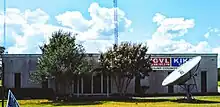
Greenville is served by Dallas/Fort Worth television stations on local cable and also regular programming.
KGVL radio serves the city of Greenville. KETR in Commerce also serves the city of Greenville due to the proximity of the two cities.
In addition to The Dallas Morning News, which serves the entire Dallas/Fort Worth area, Greenville is served by a local daily newspaper, the Herald-Banner.
Education
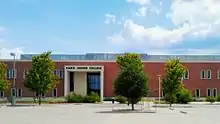
Primary and secondary education of Greenville is provided by Greenville Independent School District along with private institutions such as Greenville Christian School.
Postsecondary education is offered through Paris Junior College-Greenville Center. Texas A&M University-Commerce, a major university of over 12,000 students, is located 15 miles (24 km) northeast in Commerce.
Government
Local government
.jpg.webp)
According to the city's most recent Comprehensive Annual Financial Report Fund Financial Statements, the city's various funds had $19.9 million in revenues, $21.7 million in expenditures, $10.1 million in total assets, $1.8 million in total liabilities, and $1.4 million in investments.[25]
The structure of the management and coordination of city services is:[26]
| Department | Director |
|---|---|
| City manager | Summer Spurlock |
| City attorney | Daniel Ray |
| City secretary | Carla Oldacre |
| Police chief | Chris Smith |
| Fire chief | Jeremy Powell |
| Community development director | Steve Methven |
| Venue & Tourism manager | Micah McBay |
| Finance director | GP Ippolito |
| Human resources director | Sheri W. Wells |
| Public works director | Vacant |
| Library director | John Hayden |
| Parks and recreation director | Brett Quarles |
Greenville is a voluntary member of the North Central Texas Council of Governments, the purpose of which is to coordinate individual and collective local governments and facilitate regional solutions, eliminate unnecessary duplication, and enable joint decisions.
State government
Greenville is represented in the Texas Senate by Republican Bob Hall, District 2,[27] and in the Texas House of Representatives by Republican Bryan Slaton District 2.[28]
The Texas Department of Criminal Justice operates the Greenville District Parole Office in Greenville.[29]
Federal government
Republicans John Cornyn and Ted Cruz are Texas’s U. S. Senators. Since 2021 Republican Pat Fallon has represented Texas's 4th congressional district, including Greenville. (John Ratcliffe’s 2020 appointment as Director of National Intelligence had left the seat vacant.)
The United States Postal Service operates the Greenville,[30] Greenville Finance,[31] and Rolling Hills post offices.[32]
Transportation
Interstate 30
 Interstate 30 (Martin Luther King Jr. Freeway)[33] is a major route through Greenville. To the west, Interstate 30 goes through Rockwall and Dallas to Fort Worth. To the east, Interstate 30 goes through Sulphur Springs, Mount Pleasant, and Texarkana.
Interstate 30 (Martin Luther King Jr. Freeway)[33] is a major route through Greenville. To the west, Interstate 30 goes through Rockwall and Dallas to Fort Worth. To the east, Interstate 30 goes through Sulphur Springs, Mount Pleasant, and Texarkana.
Commercial and residential developments line the interstate from Monty Stratton Parkway through Lamar Street. The frontage roads have recently been converted to one-way for safety due to increased traffic.
U.S. highways
 U.S. Highway 67 (Martin Luther King Jr. Freeway)[33] runs concurrent with Interstate 30 through Greenville.
U.S. Highway 67 (Martin Luther King Jr. Freeway)[33] runs concurrent with Interstate 30 through Greenville. U.S. 69 (Joe Ramsey Boulevard) serves as a partial loop through Greenville. It connects with Celeste, Leonard, and Denison to the north and with Lone Oak, Mineola, and Tyler to the south. U.S. 69 is a four-lane divided highway from U.S. 380 / Texas Highway 302 to just past Business U.S. 69 (Moulton Street).
U.S. 69 (Joe Ramsey Boulevard) serves as a partial loop through Greenville. It connects with Celeste, Leonard, and Denison to the north and with Lone Oak, Mineola, and Tyler to the south. U.S. 69 is a four-lane divided highway from U.S. 380 / Texas Highway 302 to just past Business U.S. 69 (Moulton Street). U.S. 380 (Joe Ramsey Boulevard/Lee Street) heads west out of Greenville through Farmersville, McKinney, and Denton. U.S. 380 is a four-lane divided highway. Within Greenville city limits it runs mostly concurrent with U.S. 69 along Joe Ramsey Boulevard.
U.S. 380 (Joe Ramsey Boulevard/Lee Street) heads west out of Greenville through Farmersville, McKinney, and Denton. U.S. 380 is a four-lane divided highway. Within Greenville city limits it runs mostly concurrent with U.S. 69 along Joe Ramsey Boulevard.
 Business U.S. 69 follows several local streets which serve the northern, downtown, and southern areas of the city. It starts and ends at U.S. 69. The local street names are Rees Street (through Peniel), Sockwell Street (north of downtown), Stonewall Street / Johnson Street (couplet through downtown, where Stonewall is southbound and Johnson is northbound), Park Street (east of downtown), and Moulton Street (south of downtown and over Interstate 30).
Business U.S. 69 follows several local streets which serve the northern, downtown, and southern areas of the city. It starts and ends at U.S. 69. The local street names are Rees Street (through Peniel), Sockwell Street (north of downtown), Stonewall Street / Johnson Street (couplet through downtown, where Stonewall is southbound and Johnson is northbound), Park Street (east of downtown), and Moulton Street (south of downtown and over Interstate 30).
State highways
 Texas Highway 34 (Wesley Street, Wolfe City Drive) serves as a primary north-south route through Greenville and is a main commercial corridor. Connects with Wolfe City to the north and Quinlan to the south.
Texas Highway 34 (Wesley Street, Wolfe City Drive) serves as a primary north-south route through Greenville and is a main commercial corridor. Connects with Wolfe City to the north and Quinlan to the south. Texas Highway 66 (Old Dallas Highway) heads southwest out of the city towards Caddo Mills and Royse City.
Texas Highway 66 (Old Dallas Highway) heads southwest out of the city towards Caddo Mills and Royse City. Texas Highway 224 (Commerce Drive) heads northeast out of the city towards Commerce and Cooper.
Texas Highway 224 (Commerce Drive) heads northeast out of the city towards Commerce and Cooper. Texas Highway Spur 302 (Lee Street / Washington Street) serves as an east-west route through Greenville. It starts at U.S. 69 / U.S. 380 at the west end and ends at Interstate 30 at the east end. The route, mostly on Lee Street, goes through downtown as a couplet, where Lee Street goes eastbound and Washington Street goes westbound.
Texas Highway Spur 302 (Lee Street / Washington Street) serves as an east-west route through Greenville. It starts at U.S. 69 / U.S. 380 at the west end and ends at Interstate 30 at the east end. The route, mostly on Lee Street, goes through downtown as a couplet, where Lee Street goes eastbound and Washington Street goes westbound.
Farm-to-Market roads
 Farm Road 118 (Fannin Street) heads north out of Greenville from FM 499 towards Jacobia.
Farm Road 118 (Fannin Street) heads north out of Greenville from FM 499 towards Jacobia. Farm Road 499 (Forester Street) heads east out of Greenville from Spur 302 going through Campbell and Cumby.
Farm Road 499 (Forester Street) heads east out of Greenville from Spur 302 going through Campbell and Cumby. Farm Road 1569 heads west out of Greenville from a junction with highway 69 towards Merit.
Farm Road 1569 heads west out of Greenville from a junction with highway 69 towards Merit. Farm Road 1570 (Jack Finney Boulevard) serves the southern parts of the city, particularly the L-3 facility / Majors Field Airport.
Farm Road 1570 (Jack Finney Boulevard) serves the southern parts of the city, particularly the L-3 facility / Majors Field Airport. Farm Road 2101 heads south out of Greenville from Majors Airport towards Boles Home in Quinlan.
Farm Road 2101 heads south out of Greenville from Majors Airport towards Boles Home in Quinlan.
Airports
The nearest airports with passenger air service are Dallas Love Field (55.4 miles)[34] and Dallas/Fort Worth International Airport (70.0 miles).[35]
Majors Airport is a municipal airport located in Greenville.[36]
Public transportation

"The Connection" serves Greenville and all of Hunt County. The transit system operates Monday through Friday from 7 am to 7 pm. Reservations have to be made one day in advance. The charge is $2 ($4 round trip) if the passenger is traveling to a place within the same community or city, and $3 ($6 round trip) if the passenger is traveling from one city or community to another within Hunt County. The Connection will take Hunt County residents to Dallas, on a round-trip only basis: passengers are charged $34, and a minimum of three passengers is required.[37]
Notable people
- Byron Bell, player for NFL's Green Bay Packers and Dallas Cowboys
- Yusuf Bey, Black Muslim activist, founder of Your Black Muslim Bakery in Oakland, California
- John Boles, movie and stage actor of the early 20th century
- Brandon Couts, athlete, Baylor University Hall of Famer who ran professionally and specialized in 400 meter dash
- Maud Crawford, first woman to practice law in Camden, Arkansas; disappeared in 1957 amid international attention; born in Greenville in 1891[38]
- Kay Granger, a Republican politician representing Texas' 12th congressional district in the U.S. House of Representatives
- Dean E. Hallmark, pilot in the Doolittle Raid of April 18, 1942, on Tokyo; captured and executed by Japanese; member of first Greenville High School football team to reach state playoffs in 1931
- Mack Harrell, operatic baritone; father of cellist Lynn Harrell
- Stanley Hauerwas, Gilbert T. Rowe Professor of Theological Ethics at Duke Divinity School; named "America's Best Theologian" by Time magazine;
- Burt Hooton, Major League Baseball pitcher who won 151 games with the Chicago Cubs, Los Angeles Dodgers and Texas Rangers (1971–1985); pitched no-hitter in 1972; member of 1981 World Series champion Dodgers
- V. E. Howard, minister of Church of Christ who founded radio's International Gospel Hour; formerly a clergyman in Greenville[39]
- Ben Kweller, rock musician
- Haldor Lillenas, prolific hymn writer and Gospel Music Hall of Fame inductee, pastor of the Church of the Nazarene from 1920 to 1923
- George Maddox, former NFL player
- Kimberly McCarthy, convicted murderer, 500th person executed in Texas since return of
- Bart Millard, lead singer and founder of contemporary Christian band MercyMe
- Robert Neyland, Hall of Fame football coach at Tennessee and decorated officer in U.S. Army
- Collin Raye, country music singer
- Monty Stratton, Major League Baseball pitcher from the 1930s; portrayed by Jimmy Stewart in The Stratton Story
- Earl Thomas, former wide receiver of NFL's Chicago Bears, St. Louis Cardinals, and Houston Oilers
- Jimmy Thomas, former running back of NFL's San Francisco 49ers
- Mike Thomas, NFL running back for the Washington Redskins and San Diego Chargers; won Offensive Rookie of the Year in 1975 and went to Pro Bowl after 1976 NFL season
- Francia White, opera singer, radio and television personality during 1930s and 1940s
- Buzz Williams, head coach of men's basketball team at Texas A&M University
See also
- Audie Murphy American Cotton Museum
- Majors Stadium
- Greenville Municipal Auditorium
Photo gallery
.jpg.webp) Gen. Hal C. Horton Home
Gen. Hal C. Horton Home.jpg.webp) Kavanaugh United Methodist Church
Kavanaugh United Methodist Church.jpg.webp) The Texan
The Texan.jpg.webp) Downtown Greenville
Downtown Greenville.jpg.webp) Downtown Greenville
Downtown Greenville.jpg.webp) Kress Building
Kress Building.jpg.webp) Fred Ende Building
Fred Ende Building.jpg.webp) United States Post Office
United States Post Office.jpg.webp) Downtown Greenville
Downtown Greenville.jpg.webp) Downtown Greenville
Downtown Greenville.jpg.webp) Central Christian Church
Central Christian Church.jpg.webp) Washington Hotel
Washington Hotel.jpg.webp) Downtown Greenville
Downtown Greenville.jpg.webp) Hunt County Courthouse
Hunt County Courthouse.jpg.webp) Ende Building
Ende Building.jpg.webp) Masonic Lodge
Masonic Lodge
Notes
References
- "City of Greenville Texas". City of Greenville Texas. Retrieved October 19, 2012.
- "Demographics | Greenville, TX - Official Website". www.ci.greenville.tx.us. Retrieved December 30, 2018.
- "GREEN, THOMAS JEFFERSON | The Handbook of Texas Online| Texas State Historical Association (TSHA)". Tshaonline.org. Retrieved January 10, 2014.
- "Mayor and City Council | Greenville, TX - Official Website". www.ci.greenville.tx.us. Retrieved February 16, 2020.
- "City Manager | Greenville, TX - Official Website". www.ci.greenville.tx.us. Retrieved December 30, 2018.
- "2019 U.S. Gazetteer Files". United States Census Bureau. Retrieved August 7, 2020.
- "Geographic Identifiers: 2010 Census Summary File 1 (G001): Greenville city, Texas". American Factfinder. U.S. Census Bureau. Archived from the original on February 13, 2020. Retrieved March 20, 2018.
- "U.S. Census website". United States Census Bureau. Retrieved January 31, 2008.
- "US Board on Geographic Names". United States Geological Survey. October 25, 2007. Retrieved January 31, 2008.
- "Find a County". National Association of Counties. Archived from the original on May 31, 2011. Retrieved June 7, 2011.
- "GREENVILLE, TX (HUNT COUNTY) | The Handbook of Texas Online| Texas State Historical Association (TSHA)". Tshaonline.org. January 9, 1984. Retrieved January 10, 2014.
- "Greenville, Texas" Archived 2012-06-16 at the Wayback Machine, found in the Encyclopedia of Southern Jewish Communities
- Peter Carlson, "In a Bethesda Bookstore, the Prints of Propaganda", Washington Post (May 16, 2004), D01.
- Paul E. Sturdevant, "Black and White With Shades of Gray: The Greenville Sign", East Texas Historical Journal, Vol. 42, Iss. 1, pp. 25–33.
- Brian Hart, Peniel, TX, in Handbook of Texas Online (uploaded June 2010).
- Heinz, Frank (August 21, 2012). "New Details in the Death of Rare White Buffalo | NBC 5 Dallas–Fort Worth". Nbcdfw.com. Retrieved January 10, 2014.
- Davies, Maura (August 21, 2012). "Authorities say white buffalo died of natural causes | wfaa.com Dallas – Fort Worth". Wfaa.com. Archived from the original on December 15, 2013. Retrieved January 10, 2014.
- "Welcome to Lakota Ranch, Home of Lightning Medicine Cloud". Lightningmedicinecloud.com. August 24, 2012. Retrieved January 10, 2014.
- "US Gazetteer files: 2010, 2000, and 1990". United States Census Bureau. February 12, 2011. Retrieved April 23, 2011.
- "Explore Census Data". data.census.gov. Retrieved May 22, 2022.
- https://www.census.gov/
- "About the Hispanic Population and its Origin". www.census.gov. Retrieved May 18, 2022.
- "L3Harris Technologies Merger Successfully Completed; Board of Directors, Leadership and Organization Structure Announced | L3Harris™ Fast. Forward". www.l3harris.com. Retrieved November 4, 2022.
- "COMPREHENSIVE ANNUAL FINANCIAL REPORT". City of Greenville. March 29, 2019. Retrieved February 16, 2020.
- City of Greenville 2009 CAFR Retrieved 2010-11-16
- City of Greenville website Retrieved 2010-11-16
- "Senator Bob Hall: District 2". Retrieved April 24, 2015.
- "Texas House Member". Retrieved April 24, 2015.
- "Parole Division Region I Archived 2011-09-28 at the Wayback Machine." Texas Department of Criminal Justice. Retrieved on May 15, 2010.
- "Post Office Location – GREENVILLE Archived 2012-06-09 at the Wayback Machine." United States Postal Service. Retrieved on May 15, 2010.
- "Post Office Location – GREENVILLE FINANCE." United States Postal Service. Retrieved on May 15, 2010.
- "Post Office Location – ROLLING HILLS Archived 2012-06-09 at the Wayback Machine." United States Postal Service. Retrieved on May 15, 2010.
- "New name for Interstate 30 to be unveiled". Herald-Banner. June 4, 2010. Retrieved September 18, 2020.
- "Greenville to Dallas Love Field Airport". Greenville to Dallas Love Field Airport.
- "Greenville to DFW International Airport". Greenville to DFW International Airport.
- "Greenville Municipal Airport - Majors Field | Greenville, TX - Official Website". www.ci.greenville.tx.us.
- "SCRPT - Transportation". www.connectioninfo.org. Retrieved May 28, 2016.
- "Maud Robinson Crawford (1891–1957)". encyclopediaofarkansas.net. Retrieved January 14, 2011.
- "Verna Elisha Howard (1911–2000)". therestorationmovement.com. Archived from the original on December 25, 2013. Retrieved July 12, 2013.
- Romero, Simon. "A Texas Town Nervously Awaits a New Neighbor", New York Times, August 21, 2005.
Further reading
- Babb, Milton. (2010). "Hunt County, An Illustrated History." Historical Publishing Network. ISBN 978-1-935377-16-0
- Huey, Brenda. (2006). The Blackest Land The Whitest People. Bloomington: AuthorHouse. ISBN 978-1-4259-4424-7
- Mathews, Paul. (2001). I Remember... Personal Reflections on Greenville and Hunt County, Texas. Henington Publishing. ISBN 0-9709068-0-3
